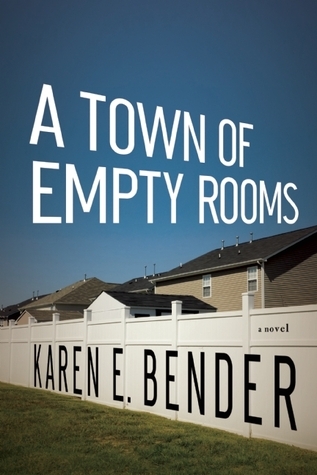Not long after her father’s unexpected death robs her of a last chance to talk to him, Serena Shine uses her company credit card to buy $8,000 worth of jewelry from Saks Fifth Avenue over a period of three days.
When her employers discover her crime and fire her, they ask Serena to explain why she did it. But she can’t explain how “it felt like a final conversation with her father, like a deep and uncontrollable act of love.”
Conversations — about love, faith, belonging and the nature of God — rattle and hum throughout Karen Bender’s outstanding new novel, “A Town of Empty Rooms.” The book itself is a series of conversations — although it is the ones we don’t have, Bender suggests, that matter the most.
Their lives ruined in New York City, Serena and her husband, Dan, who are Jewish, relocate to the South for the only job Dan can find, in Waring, N.C., a town that “boasts a plethora of churches and signs bearing messages such as, ‘If God is your Co-Pilot, Switch Seats.’” Not only do they know no one in their new community, they are now strangers to one another. Dan is reeling from the recent loss of his older brother, and this, combined with the shock of Serena’s theft, has left her normally warm, optimistic husband “encased in ice.”
Bender, who moved to Wilmington, N.C., from New York in 2002 and now teaches at the University of North Carolina, Wilmington, says she mined her own family’s experiences for some of the incidents in the novel. In the first of three parts, the couple struggle to reorient themselves. To cope with her shipwrecked life, Serena joins the local synagogue, where she is soon drawn into a needy alliance and plenty of insider squabbles. Their 5-year-old son, Zeb, enters kindergarten, the only Jewish child in his class.
Worried about Zeb’s growing unhappiness, Dan turns for support to the local chapter of the Boy Scouts, led by their new next-door neighbor, an officious octogenarian named Forrest Sanders whose initial friendliness soon turns meddlesome and threatening.
Issues of self-protection and identity permeate the story, interwoven into Dan’s certainty that the Boy Scouts can help his family assimilate, Zeb’s wistful worship of his new and very Christian best friend, and Forrest’s growing obsession with property lines and keeping the “Christ” in Christmas.
Even the snug haven of the Temple Shalom proves illusory when Serena realizes that the rabbi, an ex-army chaplain most comfortable in war zones, finds his parishioners’ needs shallow and suffocating. Unnerved by his rejection and reckless efforts to expand their modest church into a mega-temple, they urge Serena to take sides against him.
Bender balances the point of view between Serena and Dan, but also occasionally slips inside the heads of the temple members, and once, in part two, offers a glimpse of Nazi Germany through the eyes of Serena’s father, whose lifelong obsession with escape fueled Serena’s buying spree. Perhaps the most intimate conversation here arises from Serena and Dan’s fractured marriage, when events wall them off from each other into separate, closed spaces — not so much by her theft and the death of his brother, as by the unbearable memories these crises stir up.
Dan, who has spent much of his adult life “trying to find people who did not surprise him at all,” is so fixated on the Boy Scouts as a cure-all that he doesn’t hear the menacing tones in their neighbor’s voice. Nor can Dan admit to Serena how fearful he is, and why.
Serena is more conscious of trying to rise above the deafening noise in her own “empty room” in order to reach out to others, yet her attempts to reconnect with Dan vie with her unspoken attraction to the rabbi, a man as alienated and cast adrift as her late father.
Some of the book’s most touching, and sometimes funny, scenes involve its characters’ hopefulness about fixing their lives: “Zeb can learn how to make anything out of anything,” Dan assures Serena, reading out of the new Scout manual. “He can make a burner out of a tin can. On Eskimo day, he can make a blubber mitten.”
If only these skills were useful. But what the characters in “A Town of Empty Rooms” really need is a manual that explains what to do in the event of a fall from grace, the disappearance of the known world and the words needed to call for help.
Send questions/comments to the editors.



Success. Please wait for the page to reload. If the page does not reload within 5 seconds, please refresh the page.
Enter your email and password to access comments.
Hi, to comment on stories you must . This profile is in addition to your subscription and website login.
Already have a commenting profile? .
Invalid username/password.
Please check your email to confirm and complete your registration.
Only subscribers are eligible to post comments. Please subscribe or login first for digital access. Here’s why.
Use the form below to reset your password. When you've submitted your account email, we will send an email with a reset code.